#the beats of shining's self-hate; a patriarchal antagonist; heteronormative expectations; dismissal of their relationship; etc.
Explore tagged Tumblr posts
Text
Shining and Nightingale: Connection, Plot Beats, and How Their Story Makes (Even) More Sense If You Read It As Romantic

Introduction
Belonging to the Followers faction, Shining and Nightingale were among the first 6* operators introduced at launch. With damage mitigation as their niche, Shining is a single-target medic who specializes in reducing incoming physical damage, while Nightingale is an AoE medic whose specialty lies in reducing incoming Arts damage. This post will delve into everything we know about them and how it's so gay, oh my god
Design Analysis
Upon first glance, you notice how they compare and contrast each other visually: Shining is dressed mostly in black, Nightingale in white. Shining has long, thin white horns that gently jut outwards, while Nightingale has thick, black horns that fold inwards. Shining keeps her hood on by default, giving her a mysterious and secretive appearance. She has dark brown eyes, Liz has light blue ones. Shining’s outfit is tattered and ragged, really giving off the vibe of a wanderer (a “roaming doctor”, as she puts it), in stark contrast to Nightingale’s clean and put-together attire. If you squint, Shining almost looks like a harbinger of death, whereas Nightingale is angelic. Both of them wear the insignia of the Followers, a Terran version of the Caduceus. Shining wears it on a necklace (and is the actual leader), while Nightingale has it etched onto her clothes. One of the black straps on Nightingale’s outfit also reads “The path to light is dark”.

The predominant colors in both their respective skins are the complementary blue and orange. Just as black and white are opposed, so is the contrast between blue and orange. Within Shining's Silent Night, there are flickers of red-orange accents in the form of crystals, while in Nightingale's Elegy, there is the vibrant blue of her bluebird and its wings/feather. Despite Shining’s skin being a summer/beach outfit, the overall atmosphere is foreboding, given the moonlit background, presence of crows/ravens, and color choices. The backdrop in Nightingale’s is very characteristic of Gothic settings.
The strongest theme tying both their designs (and stories) together is The Gothic, an atmosphere and aesthetic best exemplified and symbolized by moody, somber colors (often black) and the gnarled, twisted branches of dead trees found in both their designs, as well as pertinent cast. (We will discuss more on their narrative ties to The Gothic)



Nightingale is featured (alongside Myrrh) in the song “Spring’s Pulse”, while Shining’s song is called “Winter Absolution”. Spring and Winter are opposing seasons, different times in which life either flourishes or hibernates. Green and red (as well as blue and red) are contrasting colors, highlighting life and death. As well as white and black, often symbolic of purity and sin.
Additionally, one of the Latin verses in Shining's song translates to:
"Sing, my tongue, redemption. Of my flesh, the mystery sing. Of the blood, all price exceeding. Shed by my immortal being. Destined for the world's redemption. From a noble womb to spring."
Profiles/Voice Lines
For the longest time, the most we could gather from their past was that Nightingale was a victim, a prisoner, forced to heal others while captive and that Shining had rescued her before they came to Rhodes Island. She has a host of ailments that mere Oripathy can't be the sole cause for, including amnesia. Through other clues, we eventually learn that Shining had a connection to someone called "Confessarius" ("Confessarii" when referring to a group), something she is noticeably evasive and uncomfortable about.

Later, the mystery slowly began to unravel as many theorized that Shining herself was involved with Nightingale's imprisonment, evidenced by Liz drawing the similarities between Shining and her captors. A shared past dripping with intrigue.

It was these seeds that provided a tantalizing story of atonement, of redemption, from someone who had committed a terrible transgression against another, complacent in her pain and suffering, whom she eventually grew to care about--so much so that Shining decided to sever all ties to her former compatriots, slaughtering many and freeing Nightingale, running away together. Shining, disgusted with her actions, spending the rest of her life atoning for her sins, of which she feels she can never be forgiven for.
The juxtaposition of Shining, unyielding with her sword, covered in the blood of her once-fellow Confessarii, and her being exceedingly gentle with Nightingale as she leads her to someplace safe, away from that room, her captors, that tower, where they (she) can’t hurt Liz ever again. The fanon that Shining was complicit in what made Nightingale the way she is, and that she is currently atoning for those sins, was largely embraced by fans.
Nightingale’s Operator Record #1 - A Song and a Blue Feather
The Op Rec is a good showcase of the Followers dynamic (with Liz as the Lady and her two knights), but it also serves to show more of Liz's personality. We only get a very baseline interpretation of who she is as a person via her official file, but seeing her interact with Nearl and Shining gives us a clearer picture of just how strong-willed she is. She goes against Shining's warnings in order to soothe the pain of an Infected child, particularly because his father was inadvertently exacerbating his condition through what Liz calls "a cage of love" (foreshadowing?).


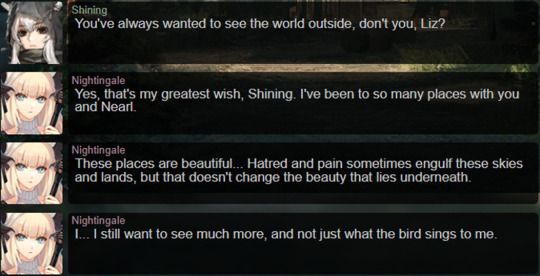
Throughout, we learn more about Liz's Arts, specifically that they give her empathic qualities and come with the drawback of shortening her lifespan every time she heals. The game-breaking ability to reverse Oripathy symptoms comes with equivalent exchange. Liz takes on the pain of others in order to make them feel better.
Near the end of the record, Liz asks if Shining is mad and to not blame Nearl for helping her. Shining's original call to avoid the town was born out of being concerned with Liz's health, but she admits that she should've respected Liz's decision. This is a stance that we then see get repeated in their future appearances in both side stories and the main plot--Shining prioritizing giving Liz agency, when she previously had none. Even when it results in Liz's condition worsening, something that Shining struggles with accepting at the same time, communicated through her asking Liz if her feeling more pain was necessary.
Nightingale’s Module #1 - Closed Hope
The module basically states outright that Nightingale views herself as a burden for having to rely on Shining and Nearl to help her navigate through life. This is another example of Liz's strong-willed personality peeking through.
"But for me, results speak loudest. Because I endured a little more pain, others can be born anew. This is very good. But… if I could be like ordinary people, without this physical pain, that spark of hope in my heart would surely shine a little bit brighter. Unfortunately, as I am now, I can only rely on others to survive. Like a light crystal in a lantern. Even if the lantern door is open, even if the light can bring warmth to others, the crystal itself is still fixed inside. It is fixed there, because it has no ability to move on its own. 'Nightingale, Nightingale––' I hope that one day, I will also be able to spread my wings and fly… just like the bird next to me. 'Nightingale, wake up already––' Until then, I must impose upon them yet more to take care of me.
...
'What's the matter, Shining?'"
In her Op Rec, she had even told Shining that if her legs had cooperated with her, she would not have asked Nearl for help, and that she would've gone out to heal that boy on her own. It's letting us know that she longs to be independent, and that she can't idly sit by as a passive observer when she has the ability to help others. Liz won't even let her own disabilities stop her from doing what she wants.
It's not a coincidence how Shining's presence in her module is represented by the analogy Liz uses to describe her predicament. Shining rescued her = the cage door is open. However, the crystal itself can't move = Liz's debilitating condition. Shining played her part in putting Liz in the cage to begin with. Shining is not only her savior, caretaker, and companion, there's a darker undercurrent as well.
Near Light
In Maria Nearl, Nightingale and Shining get a brief mention and cameo around the time Nearl crashes into the Major stadium. A connection can be made with Liz's Op Rec in which we evidently see that she and Nearl have a more physical (and arguably openly affectionate) dynamic compared to Liz and Shining. Before Nearl leaves to help her sister, we a get a brief look into her and Liz's parting conversation, in which Nearl assures Liz that she'll be okay and that Liz still has Shining with her.

In Near Light, where they get more screentime, we have the iconic Nearl and Nightingale slow dance underneath the streetlights. In the CG itself, Shining can be seen hanging back, sporting a smile. She calls Liz beautiful unprompted, which results in Liz getting a little bit flustered, already so from dancing with Nearl.
Beyond these instances fleshing out the NearLiz leg of the triangle, it's also a purposeful depiction of Shining intentionally distancing herself from Liz, presumably due to her guilt for her past actions. And how that can be extrapolated into Shining feeling as though she is unworthy to partake in that same kind of intimacy. This self-loathing mentality is once more reflected in Nearl the Radiant Knight's second Module--here's a rough translation:
"I suddenly felt a little regretful - after all, I have always hated my bloodline. I have never tasted the beauty of home and the meaning of family. She deserved to have it all, deserved to be noticed and blessed and I deserved not to be a part of it."

However, at the end of Near Light, we get the scene where Shining makes a decision to go back to Londinium with Nightingale, preparing us for their subplot with Confessarius. This exchange hangs over them like a cloud, as well as further cementing Shining's firm resolve to always remain by Liz's side, no matter her own misgivings about everything else. Even if the rest of the world is muddled in her eyes, the only thing that stays clear and in view, is Nightingale. Nothing else matters more.
Chapter 10-18
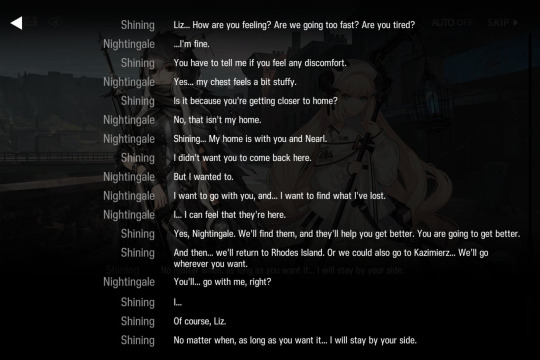
The depth of Shining’s feelings for Nightingale is truly something to take note of. "My place is always at your side" is practically a textbook subtextual/indirect confession. "I will always be at your side... for as long as you’ll have me." Because we must know that Liz has a choice. She will not impose her own wants onto Liz. Should the day arrive where Liz no longer wants her, Shining will honor it, as much as it hurts.
The way Shining navigates and conducts her feelings towards Liz in this manner is very reminiscent of the medieval concept of courtly love, which is essentially a kind of romantic love without ever imagining it to go any further. The lack of consummation is not only expected, but ideal. That the love existing in and of itself is satisfying.
The scenes where we see Shining holding back help supplement this reading. It also plays well into how the Followers are basically the "knight in shining armor" idea codified into three individuals with corresponding dynamics. For bonus points, courtly love has ties to spirituality, which coincides with another aspect of Shiningale's story with identity, fate, and their conflict with Confessarius.
The fact that Shining 's most immediate plans for the future all have to do with Nightingale is only the tip of her unending devotion. "I’ll stay with you, and go wherever you want to go, as long as you want me". And for Liz to quickly ask if Shining will come with her wherever she wants to go suggests that the love is reciprocated.
Chapter 11-10

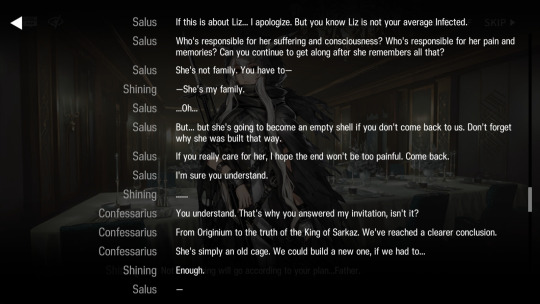

Through a series of revelations, we discover that the current head of the Confessarii is Shining's father, who is possessing the body of her younger brother. And that Nightingale was an experimental subject whose physical body is a construct, making her the equivalent of an artificial human/homunculus.
The whole scene we see just how both Confessarius and Salus view Shining, Nightingale, and their relationship. As randmsapphic puts it, the method in which they talk about Liz as an object with a purpose and that Shining's attachment to her is nothing short of a phase speaks volumes as to how dismissive and strangely self-assured that Shining will come to her senses and do the right/rational thing and bring Liz back to help her. They entertain the notion of saving Liz by way of pushing Shining to return to them, because they are the only ones who can save her. Instead of immediately resorting to threats, they rely on manipulation, pulling the "family" card, preying on and weaponizing Shining's guilt and desire to help Liz. It's not subtle--this dynamic could very easily be seen as the reactions homophobic relatives would have.
In particular, Confessarius's fixation on bloodline purity is insanely creepy and not only comes off as very homophobic, but ableist as well. Him suggesting they can build Liz a new body is coercion to get Shining to obey him (which also implies that he thinks Shining's attraction to Liz is purely physical). Salus emotionally abusing Shining by saying that all of Liz's pain is Shining's fault. Attempting to shame Shining by claiming she abandoned her family for a stranger. Does it not have the vibes of homophobia saying that Shiningale's love/relationship isn't real and will never work?
Chapter 12-10


The way Shining utterly ties her sense of self-worth to Nightingale, literally describing herself as Liz’s sin… she will not refer to Liz with possessive pronouns, but will do it to herself for her. The longing, the guilt, the resolve, the codependency… is incredibly yuri. Back in Chapter 10, Shining has an exchange with the Nachzehrer King where she says the moment she was born, she had carried sin. After the dinner in Chapter 11, she tells a Confessarius soldier (before cutting him down) that she hates herself most of all.
Of all the ways to describe her relationship with Liz, Shining decides on "I am her sin". There is poetry in how she refrains from using any kind of possessive language about Liz. Shining belongs to Liz, but Liz belongs to no one. "I am hers, and she is everything to me". It goes back to how she somewhat keeps her distance despite the overwhelming devotion. "I cannot touch her with these sinful hands".
Shining truly exemplifies devotion. Whoever was responsible for writing Shining’s dialogue is pulling out all sorts of stops to have her express her love for Liz in every way without outright making her say the words "I love Liz".
Chapter 13-9 (unfortunately tumblr has an image limit so i can't cap the entire subchapter; you really should read it yourselves for that delicious Shiningale goodness)

Kal'tsit: The way you look at Nightingale isn't just with compassion. You're not just her doctor—she's healing your fears too. Her body has its issues, but she's a member of the 'Followers', as well as your companion, and not a delicate flower that needs your protection.
Nightingale: I'm fine, Shining. You don't have to look after me so meticulously.

More examples of Liz's strong character! A dynamic becomes even more interesting when the one you thought was less-dependent turns out to desperately need the other. By this point, you should know that Shining places Nightingale incredibly high up her list of priorities. The narrative makes it no secret. They continue to hammer home that, despite being her caretaker, just how much Shining is dependent on Liz. Liz has already internally talked about how she hates having to rely on Shining and Nearl because of her ailments. In her other appearances, she makes it even more apparent with her dialogue. While Shining mends Liz’s aching body, Liz is the one who soothes Shining’s hurting heart.
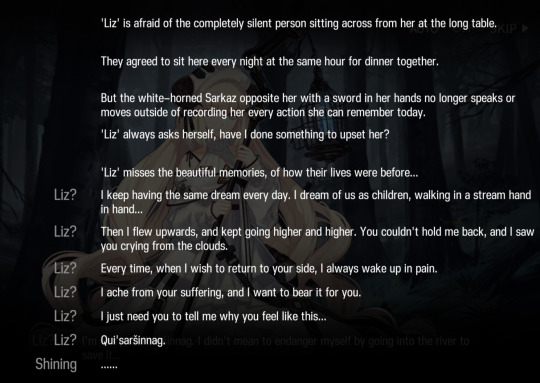
Confessarius: Poor 'Liz'. She think it's all her fault, because of the momentary kindness you showed her.
When you remember that Liz's Arts make her empathic to pain, it takes on another layer of meaning when she wants to take away Shining's suffering. It's reasonable to assume that Liz also had an attachment to Shining, even if you see it as such because Shining "brought her to life". But the vibe you get from her dialogue shows a strong affection and compassion for Shining. Arguably instinctive, considering the "nature" of who Liz originally was. A wandering spirit, a memory, a soul that was drawn to Shining because she felt her crushing pain and wanted to help her. An intangible presence given life by an achingly lonely and hurt individual.
Another post by randmsapphic suggests that Liz's "childhood memories" of her and Shining were in fact fabrications that Shining had imposed onto Liz, in some desperate attempt to have a connection with another person, which this scene confirms. Shining was so happy with Liz's creation that she quickly became attached to her. Is this a sort of twisted love/affection that was born out of Shining's self-loathing? Or her being born into a very dark and messed up lineage in which her fate is a doomed one, and so she latched onto Liz as a means of escape and a way to feel close to someone? It may have started off as such, but by the time we reach this point, the love grew to be genuine.
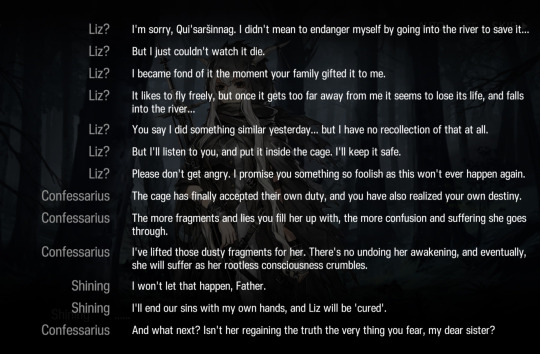
Remember in Liz's Op Rec, where she described the father hurting his son by keeping him in a cage of love?
The bluebird losing its strength the farther it travels away from home is a metaphor and reflection for how the Confessarii treat Liz, their experiment. This is the basis for her captivity. Combined with Shining's sudden shift into a cold demeanor when she had previously been warm to Liz, this only served to psychologically and emotionally damage Liz, as well as compound Shining's guilt for having continued to follow the wishes of her family.
At some point, prior to deserting, Shining had wiped Liz's memories, perhaps out of said guilty conscious, or a means to a fresh start, or even her own way to stop Liz from feeling any pain associated with those memories, but she was still afraid of what would happen should Liz recover them, which had been happening little by little. Shining had resigned herself to believing that Liz would hate her, would want nothing to do with her, if she ever found out the truth. She had to wrestle with the very real possibility that attempting to save Liz could mean losing her, or being separated from her. Shining never once saw Nightingale as a burden; she was only ever happy that Liz exists.
Credit to randmsapphic again: Every time Shining draws her sword, it's a viscerally unpleasant reminder of her eventual destiny. It's both the only way to truly free Liz, and is the bind that keeps her shackled to a doomed fate. When Confessarius offers her the sadistic choice between killing him (thus giving up her soul) or return Liz to captivity... what should she do? There is no choice here.
The way Confessarius keeps (creepily) phrasing it as Shining “giving birth” really does paint him to be a disgustingly vile patriarchal figure set on destroying not only Shining’s autonomy, but her life and relationship with Liz. How a woman is treated as an object, her worth limited to only serving as a breeding ground for the next generation. This read continues to make even more sense because remember the Confessarii dinner scene? The way they talked like they expect Shining to come home after having had her fun with Nightingale reeks of how society views lesbian relationships as not real/practice for men/just a phase. The proverbial Class S? Shiningale really is just Arknights-flavored Class S Yuri. If a Shining Alter has her pick up her sword again, it could very well symbolize her reclaiming her bodily autonomy and fighting for her love, and for the chance to have a life outside of what the patriarch(y) wants for her.
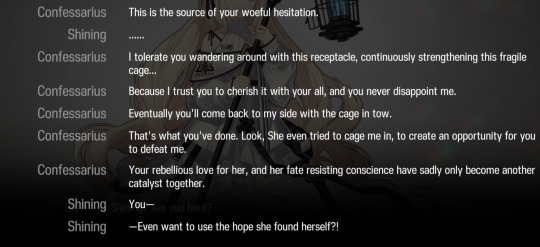

The more I read about the Shiningale in Chapter 13, the more I’m thinking that this can’t be anything else but yuri. Even the role Confessarius is playing as a villain/obstacle they have to overcome. A man getting between them by manipulating their feelings for nefarious purposes?
Liz telling Shining that she prefers her current name, how it encapsulates so much of who Shining is as a person; she's not just a means to an end for the Confessarii, she's more than what they've instilled in her since her birth. The Followers are all light-themed, and Shining is no exception. She broke Liz out of her cage and showed her the world. And Liz is the light of Shining's life, as was mentioned all the way back to her voiceline.
Liz telling Shining that she's always loved the name that she gave her... that she holds dear any and every part of Shining that's a part of her. Her gently chastising Shining for making the decision to sacrifice herself to save Liz... Don't give yourself up for me, especially without asking me. That's not what I want. For all the times that Shining made sure Liz knew she had a choice, this was the one time she didn't. Couldn't. And Liz won't have that. Whatever trials that await them, she wants to face them together with Shining.
The way Confessarius described Shining’s feelings towards Nightingale as “your rebellious love for her”. He knew that she would love Liz and factored that into his plan/manipulation of Shining. I don't know about you but… I don’t think there’s any other way to interpret that. No heterosexual explanation.
Realistically speaking, we know actual gay characters can’t make it past the censors unless it’s tragic (see Scavenger) or unrequited (see Tomimi). But Shiningale have like… playable immunity. It’s “implicit” enough to not trigger the censors but at the same time how can you not see it as romantic?
Their relationship is basically up there with Talulah/Alina. And I'd even go so far as to say that it's more explicit than Talulah/Alina. To my knowledge, they never used the word “love” to describe how Talulah felt about Alina. Just "friend". I know there's a point where subtext gets ridiculous enough to become maintext, but then that leads you to question why some get the "friends" label while others are allowed to use "love".
Could it be platonic love? Sure, of course you can love your friends. But would you pledge your entire life to a friend? What's so "rebellious" about loving a friend? (Interestingly, I think the JP translation calls it "immoral love", which is even more eyebrow-raising) Regardless, love exists between Shiningale. Confessarius knew it, and factored it into his schemes. He counted on Shining to love and cherish her. Shining loves Liz, that much is undeniable. And Liz loves her back, enough to stop Shining from sacrificing herself to save her. He's literally weaponizing the love they have for each other.
Shiningale and The Gothic
I had mentioned before that both characters' designs as well as the narrative beats of their story have Gothic literature elements. I want to make a list of the ones I could find that relate to them as characters and as a narrative:
A focus on medical conditions, doppelgangers (the "pure" Confessarii looking like each other), forbidden power/knowledge, the dichotomy between light and darkness, imprisonment, rebellion, isolation/seclusion, gloominess or a gloomy setting, the grotesque/macabre, terror/horror, justice vs revenge, good vs evil, fear and suspense, the supernatural/paranormal, female victims, prophecies/curses/omens, mystery and secrets, involvement of the clergy/religious figures (confessor/absolver of sin), the dead don’t stay dead/hauntings, romanticism
The Gothic hero is “weakened by love”, they either rescue their love interest or pine away in despair
Significance of blood (relations) and inheritance, the duality of giving and denying life
An examination of family structure, patriarchy, hereditary suffering
Dreams/nightmares, memories
Secrets, past sins, sins of the father, darkest deeds
Driven by love, duality of man (appearance)
Dwelling on the melancholy, of wistfulness and regret, but not overcoming kindness
Concept of “othering” from society (Shining split herself away from her blood family to be herself and with Liz, her chosen family
The protagonist’s passionate love is torn between his desire to achieve the beloved and the family’s disapproval, control, and choice. Gothic novels also tell the tales of love in vain. The lovers are parted due to the conspiracies of the people opposing them being together
Gothic sexuality is usually somewhat repressed—women are expected to be pure and somewhat helpless while men are expected to be quietly predatory. It's also patriarchal, with men making moves and women reacting to them
Homosexuality = the love that dares not speak its name. Repressed sexuality, forbidden desire
Female Gothic protagonists are often committed to justice, unwilling to compromise their values, loyal, respectful of others, curious, intelligent and devoted to their faith. Some are gentle, kind, likeable, clever, witty, quiet, supportive, thoughtful, hard-working, independent and strong. Others are courageous, witty, brave, determined, knowledgeable and socially competent. On the flip side, some are also strong-willed and outspoken to a fault. They’re often socially awkward, depressive, melancholy, brooding, solitary and selfish. Some are jealous, fiercely territorial, deceitful, powerless and deceptive. Others, like their male counterparts, are prone to violence
Male Gothic protagonists are often conflicted, solitary, tortured, brooding, and secretive, self-loathing, wracked with guilt, have a self-hate of their own existence
Female-centric Gothic stories often trend towards obscured/anticipated fears, focuses on persecuted women and the domestic space she risks entrapment within/disturbed spaces
Food for Thought
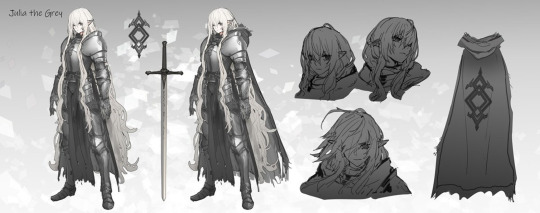
Ryuzakiichi has a knight original character. Tell me... this doesn’t just look like Shining without horns? THE RESEMBLENCE IS UNCANNY.

Knowing this, I'm convinced that he split the concept of a "knight in shining armor" into two characters: Nearl and Shining. Nearl embodies chivalry. Shining embodies devotion.
The followers dynamic can best be summarized as two knights swearing fealty to one lady, but what's interesting is that while Nearl is the most obvious depiction of a knight, it's actually Shining who serves the role even harder, because she is quite literally Liz's knight. Which tracks with how Shining looks nearly like a carbon copy of his OC. She's the one who rescued the princess from her tower, while simultaneously being the "wicked witch" who put her there in the first place. And just like a Gothic hero, is tormented and sees herself as a monster.
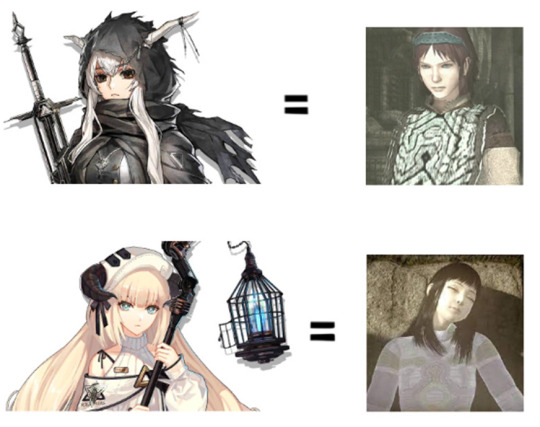
Comparison to the main plot of Shadow of the Colossus. The driving force is that Wander commits acts (largely agreed to be treasonous) in order to revive Mono. The relationship between Wander and Mono is left up to interpretation as to whether it's platonic, familial, or romantic, but most fans of the game seem to theorize that Mono is indeed Wander's love interest.

Normally I despise turning the Followers into a nuclear family unit in any direction (especially people saying Liz is a minor and infantilize her to be the designated "child"), but for a moment, seeing Shiningale looking at Nearl’s portrait, my brain interpreted them behaving like Nearl’s (substitute) parents being proud of her accomplishments.
This was not helped by stuff like Shining’s teasing ("Look at you, our knight acting snarky"), Liz asking if she and Shining were also Nearl’s family, and some apparent discussion about Mlynar being a "bad end" Margaret who lost his own light (his brother and sister-in-law, Margaret’s parents).
If Shining and Nightingale are to Nearl as Schnitz and Yolanta were to Mlynar, then that might also explain why he dropped his jerk behavior for one second just to compliment how the two Sarkaz were good for his niece. If Nearl had never met Shining and Nightingale, her own light might’ve gone out too...?
IN CONCLUSION
Shiningale are complementary in so many ways. It really feels like several aspects of their characters are tailor made to match; you can’t have one without the other, their development is tied together… soulmates. Hopefully this post helps encourage you to consider their story in a certain lens if you hadn't before.
To quote a CN post I saw on the matter after Chapter 13 was released (rough translation): "Shining's sword pieced Nightingale's heart, and Liz came alive. Liz's existence helped give Shining emotions. Liz became Shining's redemption. Shining renounced her old name and Liz cherishes hers, a transformation of two people choosing to fight and change their destiny. Although Liz is physically fragile, her spirit and will are very strong. Although Shining has excellent swordsmanship, her self-hate and inner turmoil weigh her down. They are truly complementary in every sense."
They each want to take away the other's pain. Shining doesn't want Liz to die. Liz doesn't want Shining to die for her. They are each other's mutual salvation.
#dl talks ak#arknights#shining#nightingale#tl;dr i'm not saying that romantic love is the true intent for their relationship#but that their story feels more effective if you do interpret it as such#it's a spiritual story about defying fate; but also a very yuri one#the beats of shining's self-hate; a patriarchal antagonist; heteronormative expectations; dismissal of their relationship; etc.#can just as well be applied to yuri; specifically of the 'class s' variety#I FINALLY WROTE IT
219 notes
·
View notes